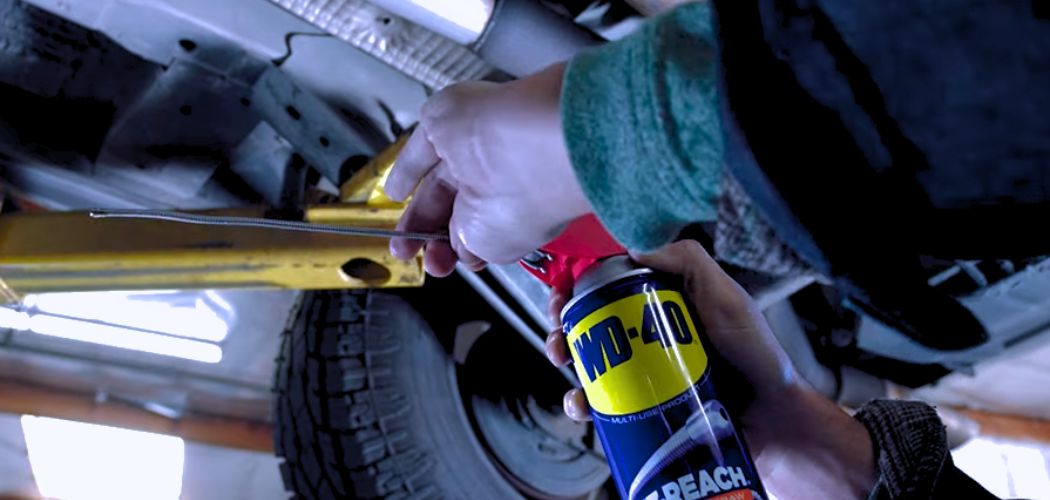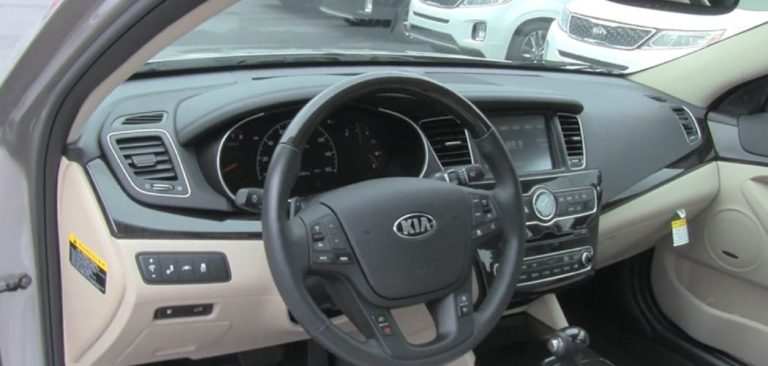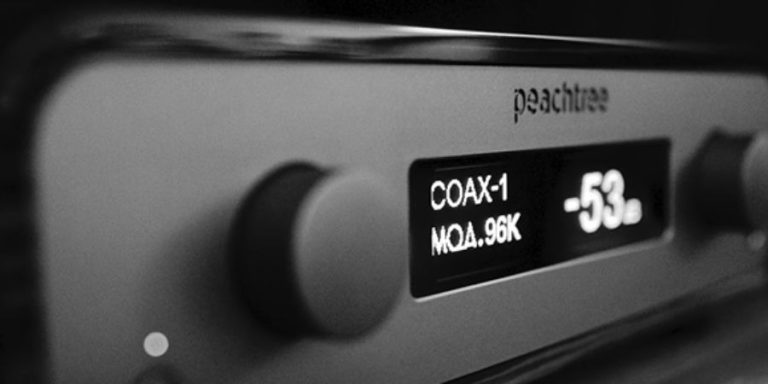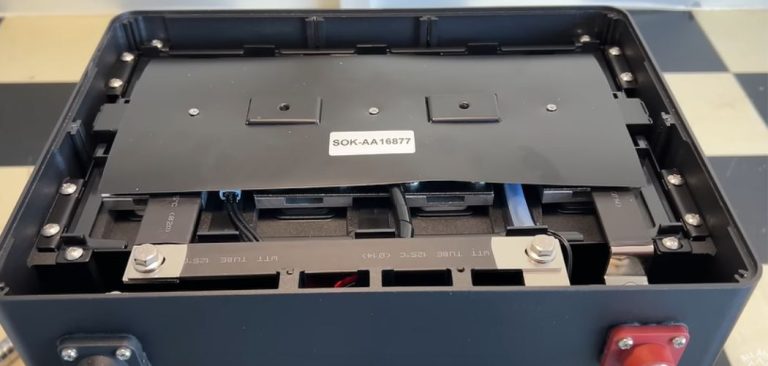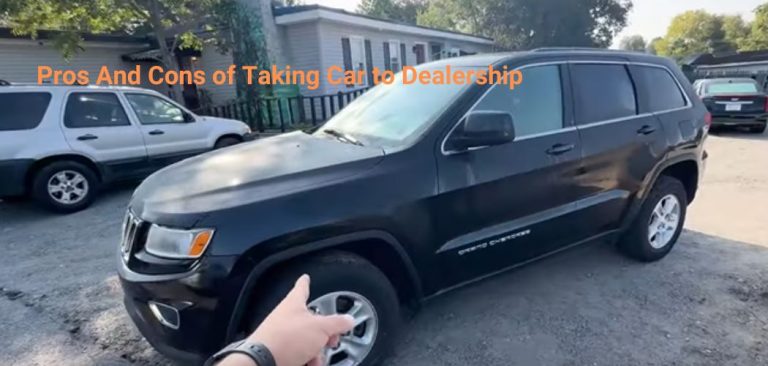Caring for your car’s brakes is crucial for your safety. Many car owners wonder about using household products like WD-40 on their brakes. This common product is great for various tasks, but it isn’t suitable for everything. Using the wrong product on your brakes can lead to serious issues.
In this post, I will explore why WD-40 is not a good choice for brake maintenance. I will also look at safer alternatives to keep your brakes in top condition. Stay tuned to learn how to properly care for one of the most important parts of your vehicle.
Introduction To Wd-40
WD-40 is a well-known household name. It’s often called the “handyman in a can” due to its many uses. But what exactly is WD-40? Let’s dive in.
What Is Wd-40?
WD-40 stands for Water Displacement, 40th formula. It was created in 1953 by a chemist named Norm Larsen. He was trying to develop a formula to prevent rust and corrosion. The 40th attempt was successful, thus the name WD-40.
WD-40 is a versatile product. It consists of lubricants, anti-corrosion agents, and ingredients for water displacement. Its unique formula allows it to penetrate and remove moisture. This makes it an excellent tool for many tasks.
Common Uses
WD-40 has many uses around the house and garage. People use it to stop squeaky doors, loosen rusty bolts, and clean tools. It’s also great for removing stickers and labels from surfaces.
Many car owners use WD-40 for various maintenance tasks. It can help lubricate car parts and protect them from rust. Some use it to clean and shine their car’s exterior.
But, is it safe for car brakes? This is a common question among car owners. Let’s explore this further in the next section.
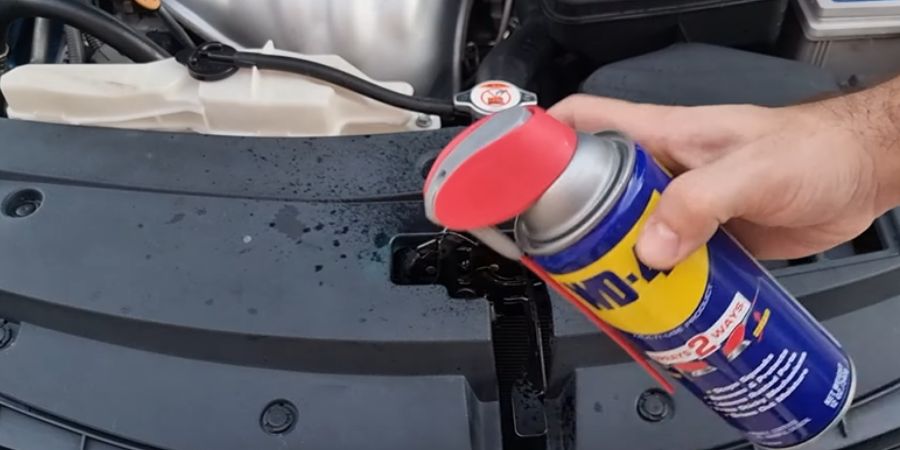
Car Brake Maintenance
Maintaining your car brakes is crucial for safe driving. Regular brake maintenance prevents accidents and ensures your vehicle stops effectively. Neglecting brake care can lead to serious problems and expensive repairs. Let’s dive into the importance of brake maintenance and common brake issues.
Importance Of Brake Maintenance
Brake maintenance ensures your car stops quickly and safely. Well-maintained brakes improve your car’s overall performance. Regular checks help detect wear and tear early. This prevents costly repairs. Good brakes also enhance fuel efficiency. You won’t need to press the pedal as hard.
Regular brake maintenance extends the life of your brake system. It includes checking brake pads, rotors, and brake fluid. Replacing worn-out parts on time is key. It ensures your brakes function correctly. Brake inspections should be done every six months. Or every 10,000 miles, whichever comes first.
Common Brake Issues
Brake noise is a common issue. Squeaking or grinding sounds indicate worn-out brake pads. Ignoring these sounds can damage the rotors. Another issue is a vibrating brake pedal. This can be due to warped rotors. The car may pull to one side while braking. This points to uneven brake pad wear. Or issues with the brake caliper.
Soft or spongy brakes are another concern. This may indicate air in the brake lines. Or a brake fluid leak. A burning smell after braking is serious. It suggests overheated brakes. Immediate inspection is needed. Brake warning lights on your dashboard shouldn’t be ignored. They signal a problem with the brake system.
Wd-40 On Car Brakes
Many car owners ask if they can use WD-40 on their car brakes. WD-40 is a versatile product. It is used for lubrication, rust prevention, and cleaning. But is it safe for your car brakes? Let’s find out.
Potential Risks
Using WD-40 on car brakes can be risky. Brakes need friction to work. WD-40 is a lubricant. It reduces friction. This can make your brakes less effective.
WD-40 can also attract dust and dirt. This can build up on the brake pads. It can cause more problems over time. Using WD-40 on brakes can be dangerous. It can lead to brake failure.
Manufacturer Recommendations
Car manufacturers do not recommend using WD-40 on brakes. They design brakes to work with specific materials. Using other products can void warranties.
Always follow the guidelines in your car’s manual. Use products that are made for brake maintenance. This ensures your brakes stay safe and effective.
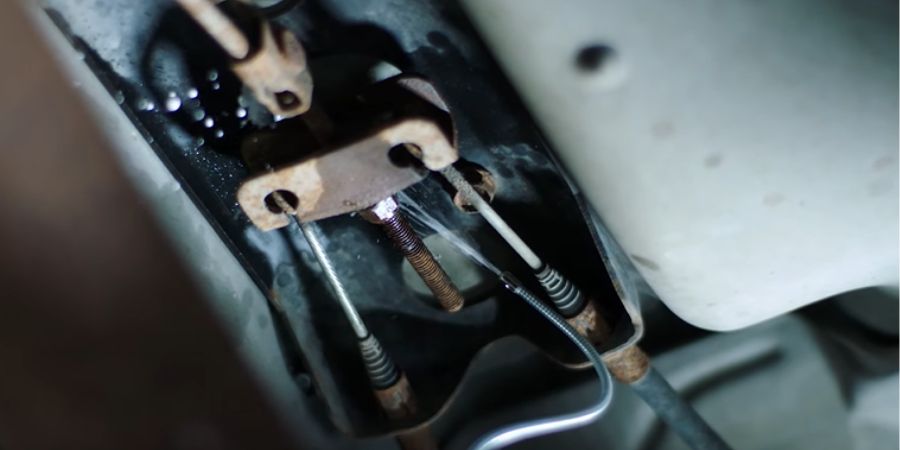
Safety Concerns of Wd -40 on your car Brake
When it comes to your car, safety is paramount. You wouldn’t want to compromise on that, would you? Using WD-40 on your car brakes raises serious safety concerns. Let’s dive into why this might not be such a good idea.
Brake Performance Impact
WD-40 is a lubricant, and while it’s great for squeaky hinges, it’s not meant for brakes. Your brakes rely on friction to stop your car. Spraying WD-40 on them can significantly reduce this friction. Imagine trying to stop your car, but it keeps sliding forward. Scary, right?
Here’s a quick comparison table to illustrate the impact:
Without WD-40 | With WD-40 |
High friction, effective braking | Low friction, ineffective braking |
Possible Accidents
Reduced braking efficiency isn’t just an inconvenience; it can lead to accidents. If your brakes are compromised, you’re at risk of rear-ending the car in front of you or even worse. Picture this: you’re driving down a hill and suddenly need to stop, but your brakes are slippery. It’s a recipe for disaster.
Consider these potential scenarios:
- Increased stopping distance
- Higher chance of skidding
- Potential for brake failure
It’s not just about you either. Other drivers and pedestrians are at risk too. So, let’s keep the WD-40 for the door hinges and not the brakes.
In conclusion, using WD-40 on your car brakes is a bad idea. It can severely impact brake performance and increase the risk of accidents. Always prioritize safety and use products designed specifically for brakes. Stay safe out there!
Expert Opinions
Thinking of using WD-40 on your car brakes? You’re not alone. Many car owners ponder this question. Let’s dive into what the experts say about this matter.
Mechanic Insights
Most mechanics would likely advise against using WD-40 on your car brakes. Why? Here’s the scoop:
- Brake Performance: WD-40 is a lubricant. Brakes need friction to stop your car. Lubricants reduce friction. You see the problem?
- Safety First: Imagine trying to stop your car and realizing the brakes are slippery. Scary, right?
- Possible Damage: WD-40 can damage brake components. It might cause the rubber seals to swell or degrade.
One mechanic shared a story about a customer who used WD-40 on their brakes. The customer thought it would stop a squeak. Instead, their brakes became dangerously ineffective. The result? A costly repair and a dangerous situation. Mechanics know the ins and outs of vehicle safety. They recommend using products specifically designed for brakes.
Automotive Engineer Views
Automotive engineers, with their deep understanding of vehicle systems, also caution against using WD-40 on brakes.
- Material Compatibility: Engineers design brake systems with specific materials in mind. WD-40 can interfere with these materials.
- Brake Fluid Interaction: Engineers warn that WD-40 can mix with brake fluid. This can lead to brake failure.
- Testing and Standards: Engineers test brake systems under rigorous conditions. WD-40 is not part of these tests.
One engineer recounted an incident where a test vehicle’s brakes failed after someone used WD-40. This was during a high-speed test. The failure highlighted the importance of using proper brake cleaners.
In conclusion, both mechanics and automotive engineers agree: WD-40 and brakes are a risky mix. Stick to brake-specific products for safety and performance. Your brakes are vital for your safety. Treat them with the care they deserve.
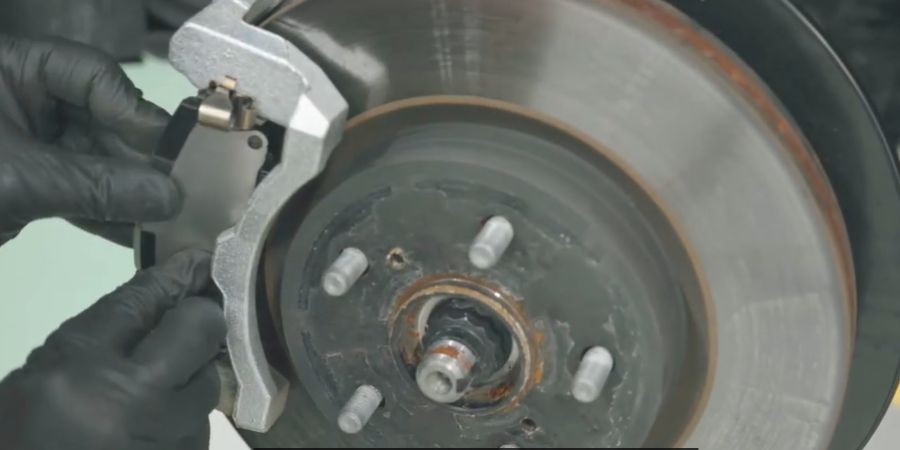
WD-40 Alternative Brake Cleaners
So, you are wondering if you can use WD-40 on your car brakes? Well, hold your horses! While WD-40 is great for many things, it is not the best choice for cleaning car brakes. But don’t fret. There are plenty of other options out there. Let’s dive into some effective alternative brake cleaners that will keep your brakes in tip-top shape.
Brake Cleaner Products
When it comes to brake cleaners, there are many products available in the market. These are specially formulated to clean brakes without leaving any residue. Here are some popular choices:
- CRC Brakleen: This is a favorite among car enthusiasts. It cleans brake parts quickly and dries fast.
- 3M High Power Brake Cleaner: Known for its powerful cleaning action, it removes dust, grease, and oil efficiently.
- Permatex Non-Chlorinated Brake Cleaner: This product is tough on grime but gentle on the environment as it is non-chlorinated.
Diy Cleaning Solutions
If you prefer a more hands-on approach, there are some DIY solutions that can work wonders on your brakes. Here are a few easy recipes you can try at home:
- Vinegar and Water: Mix equal parts of white vinegar and water in a spray bottle. Spray it on the brake parts and wipe clean with a cloth. The vinegar will cut through the grime.
- Dish Soap and Warm Water: A few drops of dish soap mixed with warm water can also do the trick. Use a brush to scrub the brakes and rinse with water.
- Alcohol-Based Cleaner: Rubbing alcohol is great for cleaning brakes. Just pour some on a cloth and wipe the brake parts. It evaporates quickly and leaves no residue.
Choosing the right cleaner for your brakes is crucial for your safety and the longevity of your car. While WD-40 might be handy for many things around the house, it’s best to leave it out of your brake-cleaning routine. Instead, try one of the above alternatives and keep your brakes squeaky clean!
So, what’s your go-to brake cleaner? Have you tried any DIY methods? Share your experiences in the comments below. Happy cleaning!
Proper Brake Maintenance Tips
Proper brake maintenance is essential for your car’s safety and performance. Maintaining your brakes can prevent accidents and save you money. Avoid using WD-40 on your brakes. It can reduce braking efficiency. Follow these tips to keep your brakes in top shape.
Regular Inspections
Check your brakes every six months. Look for worn-out pads and rotors. Listen for unusual sounds. Squealing or grinding noises mean trouble. Check brake fluid levels too. Low fluid can affect braking power. Always keep an eye on your dashboard warning lights.
Professional Servicing
Visit a mechanic at least once a year. Mechanics can spot hidden issues. They check for leaks and damage. Professionals can replace worn parts. Regular servicing extends your brakes’ life. Always follow your car manufacturer’s service schedule.
Emergency Situations
Sometimes, emergencies happen. You may notice issues with your car brakes. You might consider quick fixes. One question that arises is, can you use WD-40 on car brakes? Let’s explore this topic further.
Temporary Fixes
WD-40 is a lubricant. It can stop squeaky noises. In an emergency, you may use it. Spray a small amount on the brake rotor. Be careful though. WD-40 is not a permanent solution. It can make brakes slippery. This reduces braking efficiency.
Use it only to get home or to a mechanic. Remember, this is a temporary fix. Proper brake maintenance is crucial for safety. Do not rely on WD-40 for long-term use.
When To Seek Help
If brakes still malfunction, seek professional help. A mechanic can diagnose the problem. They will provide a permanent solution. Do not delay repairs. Faulty brakes are dangerous. Always prioritize safety over temporary fixes.
Regular brake checks are important. Visit a mechanic regularly. This prevents emergencies. Safety should always come first.
Cost Implications
Using WD-40 on your car brakes might sound like a quick fix, but it could lead to a variety of cost implications. Let’s dive into the potential expenses and weigh the options.
Repair Costs
When it comes to car brakes, using WD-40 can cause more harm than good. Brakes need to provide friction to stop your car. WD-40 makes things slippery, which is not what you want for brakes. If you use WD-40 on your brakes, it can damage the brake pads and rotors.
Replacing brake pads and rotors is not cheap. Depending on your car model, you could be looking at $300 to $800 for parts and labor. That’s a hefty price to pay for what seemed like a small mistake, right?
Prevention Vs. Repair
Now, let’s talk about prevention. Preventing brake issues is always better than repairing them. Here’s why:
- Cost-Effective: Regular maintenance costs less than repair.
- Safety: Proper brakes are crucial for safe driving.
- Peace of Mind: Knowing your brakes are in top shape is reassuring.
So, how do you prevent brake problems? Simple: use the right products. Stick to brake cleaners that are designed for the job. They keep your brakes clean without causing damage.
Think of it this way: Would you use dish soap to wash your hair? Probably not. The same logic applies to car brakes. Using the right product prevents costly repairs down the road.
| Action | Cost |
|---|---|
| Using WD-40 | $300 – $800 (potential repairs) |
| Using Brake Cleaner | $5 – $10 per can |
In conclusion, while WD-40 is great for many things, it’s not suitable for car brakes. Stick to the right products and save yourself from costly repairs.
Legal And Warranty Issues of WD-40 on your Car Brakes
So, you’ve been wondering, “Can I use WD-40 on my car brakes?” It’s a good question, and it’s crucial to understand the legal and warranty issues that come with it. Why? Because using the wrong product on your car brakes can have serious consequences. Let’s dive into the nitty-gritty details below.
Warranty Voids
First things first, let’s talk about warranties. We all love them, don’t we? They make us feel secure. But did you know that using WD-40 on your car brakes can void your warranty? Yes, you heard it right.
- Manufacturer’s Terms: Most car manufacturers have strict guidelines on what products you can and can’t use on your vehicle. WD-40 is not on the approved list for brake maintenance.
- Proof of Proper Maintenance: When you take your car for warranty claims, the manufacturer might ask for proof of proper maintenance. If they find out you’ve been using WD-40 on your brakes, they can refuse your claim.
- Costly Repairs: Voiding your warranty means you’ll have to pay for any brake-related issues out of pocket. Ouch, that can get expensive!
So, before you reach for that WD-40 can, think about the possible consequences. It’s better to use products that are specifically designed for car brakes.
Legal Implications
Now, let’s shift gears and talk about the legal side of things. You might be thinking, “What legal issues could there be?” Well, let me break it down for you.
- Safety Regulations: Using WD-40 on your car brakes can make them less effective. This can be a violation of safety regulations, depending on where you live.
- Accidents and Liability: If your brakes fail and you get into an accident, you could be held liable. Imagine explaining to the insurance company that you used WD-40 on your brakes. Not a fun conversation!
- Vehicle Inspections: Some places have regular vehicle inspections. If the inspectors find out you’ve been using an unapproved product on your brakes, you could face fines or other legal repercussions.
So, while WD-40 is a fantastic product for many things, your car brakes are not one of them. Stick to the right products, and you’ll save yourself a lot of headaches in the long run.
In conclusion, understanding the legal and warranty issues of using WD-40 on your car brakes is crucial. Always read your car’s manual and follow the manufacturer’s guidelines to keep your vehicle in tip-top shape. After all, better safe than sorry, right?
Frequently Asked Questions
Is It Okay To Spray Wd40 On Brakes?
No, it is not okay to spray WD40 on brakes. It reduces friction, causing brake failure and unsafe driving conditions. Use brake cleaner instead.
What Can I Spray On My Brakes To Make Them Stop Squeaking?
Use a brake cleaner to stop squeaking. Apply it directly to the brake components. Ensure brakes are cool before spraying.
What Lubricant Can I Use On My Brakes?
Do not use any lubricant on brake components. Lubricants can cause brake failure. Use only brake-specific cleaners or anti-squeal compounds.
Will Wd40 Stop Brakes Grinding?
No, WD40 should not be used on brakes. It can reduce braking efficiency and cause dangerous situations. Use a proper brake cleaner.
Conclusion
Using WD-40 on car brakes is not a good idea. It can harm brake components. Always use products meant for brakes. Safety comes first. Regular brake maintenance ensures your car runs smoothly. Proper care extends brake life. Follow manufacturer guidelines for the best results.
If unsure, consult a professional mechanic. They can offer expert advice. Keep your brakes in top shape. Drive safely and confidently.

